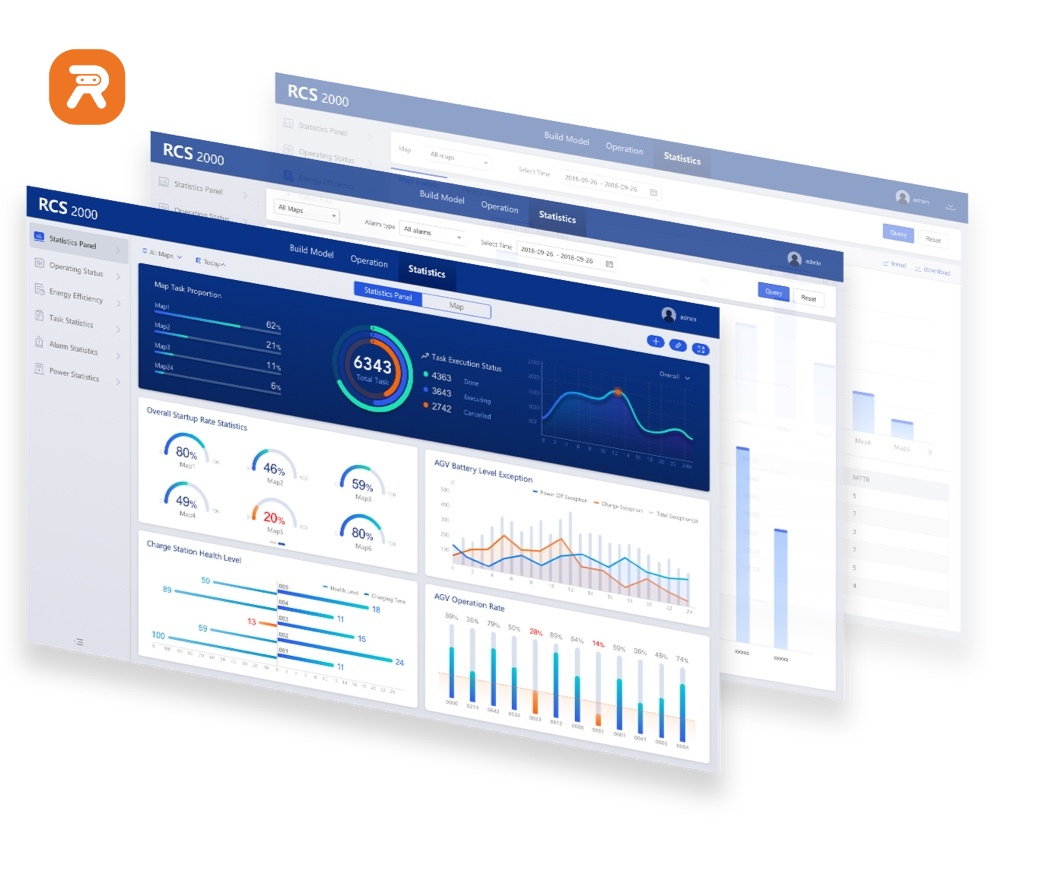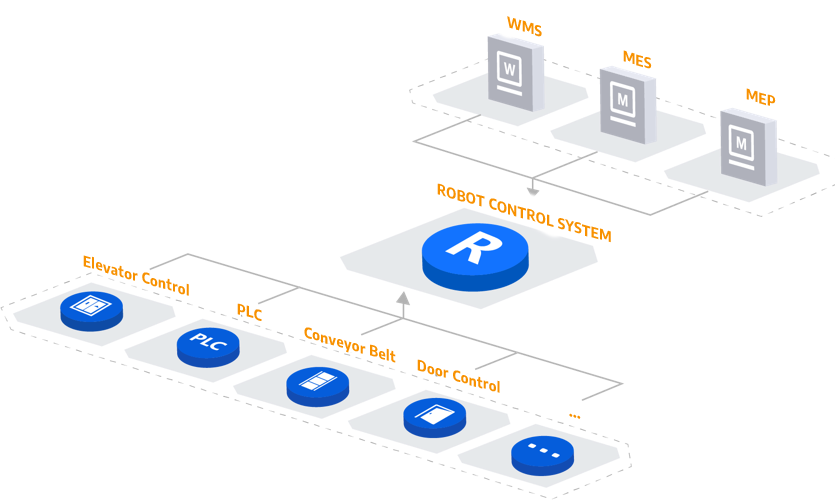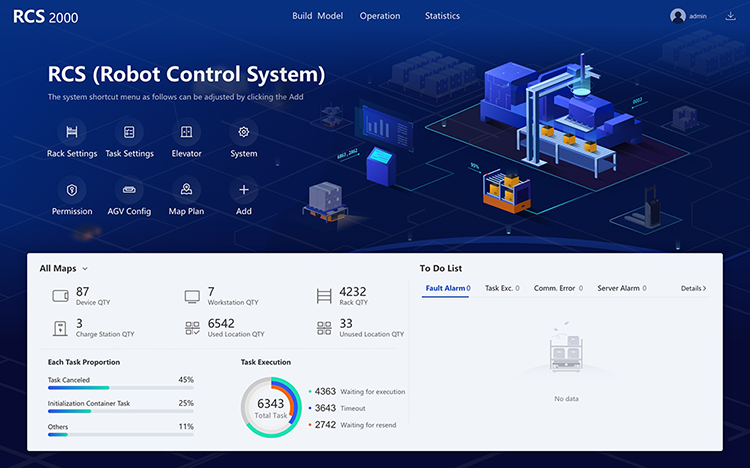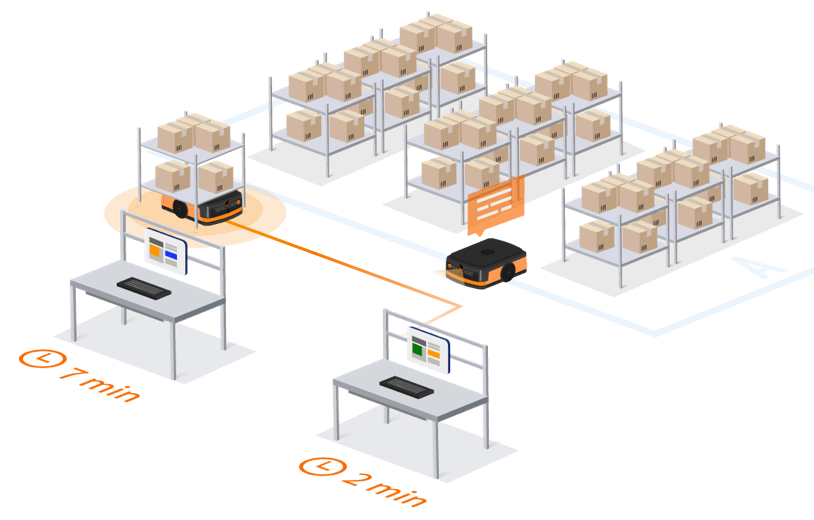Putting smart robots into the complex manufacturing industry and realizing large-scale flexible production cannot be achieved by one “person” alone, and “teamwork” is the kingly way. Robot control system RCS, like the robot’s movement center, integrates key AI technologies such as machine learning and multi-agent game, from positioning and navigation of a single robot, motion control, to multi-robot collaboration, allowing mobile robots with single intelligence work together and move towards swarm intelligence.

1. Flexible configuration of multiple models and multiple navigations
With the large-scale development of warehouses, production line handling, and in-plant logistics, multi-robot cluster operations are crucial. RCS can realize cluster scheduling of thousands of robots. For mixed handling scenarios, RCS can mix and dispatch full series and multi-model robot products to achieve optimal task allocation, scientific path planning and perfect traffic dynamic management, so that multi-series robots can cooperate with each other to maximize their effectiveness.
For different scene environments or conditions, RCS can satisfy the robot’s smooth switching between different navigation methods such as visual SLAM and laser SLAM (VSLAM, LSLAM). At the same time, RCS can communicate with mobile robots, establish map models through the SLAM algorithm, and realize the robot’s autonomous obstacle avoidance and autonomous search for targets.

2. System flexibility meets individual needs
RCS can be seamlessly connected with WMS, MES, ERP and other enterprises’ upper and lower systems. Through system configuration, it can complete the combination configuration of various tasks of mobile robots, manage the running status and path of robots in an all-around way for 24 hours, and realize production and production. Transparent, integrated, and intelligent logistics management. For different business scenarios, RCS provides standard interfaces for two docking modes of warehousing and handling, showing high compatibility and scalability.

In addition, RCS integrates the WCS module inside, which supports the connection with various external devices such as automatic doors, distribution walls, PLC, elevator control, door control, transmission, and storage belts, and completes collaborative management and unified scheduling of resources, and supports Fully configurable system rules and policies can meet the user’s personalized business scenarios and job processes.
3. Operation and maintenance analysis makes the data clear at a glance
RCS adds a new operation management center, which is convenient for server resource integration and unified management. The operation management center is a platform software dedicated to software monitoring and troubleshooting. It can provide automatic indicator detection and alarm, batch centralized deployment configuration, software version management, efficient log analysis and other functions to help users discover and solve problems in a timely manner and improve delivery, operation and maintenance efficiency, providing a strong background guarantee for the business platform.
The new version of RCS optimizes the statistical Kanban function, supports multi-dimensional statistics and analysis, and can be configured with various functional modules, including task statistics, performance statistics, power/charging pile statistics, alarm statistics, etc., to meet the needs of users in different dimensions. screen display function. Managers can clearly understand the data status of various tasks and equipment, so as to better plan operations and improve the logistics efficiency of the production process.

4. AI algorithm realizes intelligent decision-making
How do the workbenches in the warehouse realize the load balancing of picking tasks? RCS integrates machine learning algorithms on the basis of traditional operational optimization algorithms. Based on big data analysis, RCS can intelligently make decisions about the behavior of robots.

Through in-depth mining of data in each link of the digital factory, the system can analyze and predict the time when the workbench generates tasks, schedule idle mobile robots to wait at the task points in advance, and improve the overall logistics efficiency; based on the analysis and prediction of historical data, the system can predict the shelves Picking at the workbench is time-consuming, and then intelligently adjust the queuing strategy of the robot to shorten the task waiting time; in addition, the system can also evaluate the congestion degree of the route and the busyness of the workbench, and reasonably control the order and timing of the handling of the shelves, so as to realize the Platform task load balancing.
Dynamic warehousing, production line handling, in-plant logistics, and other businesses put forward higher requirements for the transformation of production automation and the flexibility of solutions. The Hikvision robot control system RCS, which integrates flexibility, digitalization, and intelligence, enables multi-series and multi-type robots to "perform their duties" and work collaboratively, realizing their organic integration with production systems, enterprise business systems, and humans. Continuously expand the greater value of swarm intelligence in the field of intelligent manufacturing.
To learn more about the AMRs – autonomous mobile robots and get a comprehensive automation solution, feel free to contact us. With a team of highly qualified and experienced engineers, Rozitek is confident to provide the most suitable solution and bring a different change for customers.
ROZITEK – INTELLIGENT INTRALOGISTICS SOLUTIONS
Email: info@rozitek.com
